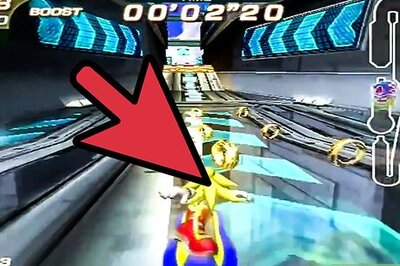
views
The Hague: From deep in the Sahara, fearing that he will share his father's bloody fate at the hands of vengeful Libyans and calling in old favours bought with oil from desert tribes and African strongmen, Saif al-Islam Gaddafi may be bartering a future.
The International Criminal Court at The Hague confirmed on Friday that the 39-year-old heir-apparent to Libya's slain former leader had been in touch. It urged him to turn himself in, warning it could order a mid-air interception if he and his mercenary guards tried to flee by plane for safe haven abroad.
Though details remain sketchy of the whereabouts and state of mind of Saif al-Islam, the London-educated would-be reformer now indicted for crimes against humanity, the ICC offered some corroboration of reports from Tripoli's new leaders and African neighbours that he has taken refuge with Tuareg nomads in the borderlands between Libya and Niger, seeking a way to safety.
"Through intermediaries, we have informal contact with Saif," ICC Prosecutor Luis Moreno-Ocampo said in a statement.
"We have learnt through informal channels that there is a group of mercenaries who are offering to move Saif to an African (state) not party to the ICC. The Office of the Prosecutor is also exploring the possibility to intercept any plane within the air space of a state party in order to make an arrest."
Officials with Libya's National Transitional Council told Reuters earlier in the week that monitoring of satellite calls and other intelligence indicated Saif al-Islam was considering turning himself in to The Hague, and trying to arrange an aircraft to get him there and out of reach of NTC fighters, in whose hands Muammar Gaddafi was beaten and killed a week ago.
Desert friends
However, surrender is only one option. The Gaddafis made friends with desert tribes in Niger, Mali and other poor former French colonies in West Africa, as well as farther afield in countries like Zimbabwe and Sudan, some of them also recipients of largesse during the 42-year rule of Colonel Gaddafi, a self-styled son of the desert and African "king of kings".
France, a key backer of Febuary's revolt, reminded Africans of obligations to hand over the surviving ICC indictees - former intelligence chief Abdullah al-Senussi and Saif al-Islam: "We don't care whether he goes on foot, by plane, by boat, by car or on a camel, the only thing that matters is that he belongs in the ICC," said Foreign Ministry spokesman Bernard Valero.
"We don't have many details, but the sooner the better."
Despite reduced circumstances since his father's overthrow in August, the younger Gaddafi, whom some have described as a playboy in his days at the London School of Economics, may have access to portable wealth in the form of bundles of banknotes and gold bars, as well as to secret, unfrozen foreign accounts.
Niger, Mali, Chad and Burkina Faso, a swathe of arid states to the south of Libya, are all signatories to the treaty that set up the ICC, established to give a permanent international tribunal for crimes against humanity after ad hoc bodies set up for Rwanda, the former Yugoslavia and Sierra Leone.
"If we reach agreement, logistical measures for his transfer will be taken," ICC spokesman Fadi El Abdallah said. "There are different scenarios, depending on what country he is in."
Without its own police force, the ICC depends on cooperation from member states -- which do not include world powers the United States, Russia and China. Its focus so far on Sudanese, Congolese and Kenyans has left some Africans disgruntled.
Powers on the continent like South Africa and Nigeria are signatories. But Algeria, which took in Saif al-Islam's mother, sister, brother Hannibal and half-brother Mohammed, is not. Nor are Sudan, Robert Mugabe's Zimbabwe and a number of other nations where leaders might see advantage in giving him a haven.
Mercenaries
As well as enjoying protection from Tuareg allies who traditionally provided close security for the Gaddafis, Saif al-Islam may still be in the company of mercenaries from elsewhere in Africa, including possibly South Africa, NTC officials say.
A South African newspaper, in an unconfirmed report, said South African mercenaries were working to fly him out.
Living conditions in the desert are spartan, though the autumn climate is relatively temperate. Smugglers and others who make a living in the desert travel in 4x4s and trucks, watching fuel gauges closely, as well as by horse and camel, resting in tents as well as simple shacks scattered close to oases.
Communications are provided by satellite phones powered by car engines and generators, but also networks of nomads.
A bodyguard who saw Saif al-Islam as he fled last week from one of the Gaddafi clan's last bastions near the capital told Reuters that Saif al-Islam, eldest son of Gaddafi's second wife Safia, seemed "nervous" and "confused". He escaped even though his motorcade was hit by a NATO air strike as it left Bani Walid on Oct. 19, the day before his father died at Sirte.
Three of Saif al-Islam's brothers were killed in the war. Another, Saadi, has found refuge in Niger.
The arrest or surrender of Saif al-Islam would bring a new prominence for the nine-year-old ICC, whose highest profile suspect to date is Sudanese President Omar al-Bashir, who remains defiantly in office, defended by many fellow Africans.
International court
Following the killing of Muammar Gaddafi, most probably at the hands of the fighters who filmed themselves battering and abusing him, Western allies of Libya's new leaders had urged them to impose respect for human rights, even for those accused of scorning the rights of others down the decades.
NTC leaders would like to run their own trials, but acknowledge that their writ barely runs in the deep south.
Their NATO allies, now winding up a mission that backed the revolt, have expressed little enthusiasm for hunting a few individuals across a vast tract of empty continent -- though French troops based in West Africa might be the best placed to step in with transport if Gaddafi did choose to surrender.
Richard Dicker of the New York-based Human Rights Watch said the killing of his father made it all the more important that Saif al-Islam end up on trial in the Netherlands:
"The gruesome killing of Muammar Gaddafi last week underscores the urgency of ensuring that his son, Saif al-Islam, be promptly handed over to the International Criminal Court for fair trial in The Hague," Dicker said.
"This will best ensure that justice is done."
The ICC's Moreno-Ocampo said in his statement: "If he surrenders to the ICC, he has the right to be heard in court, he is innocent until proven guilty. The judges will decide.
"If the judges decide that Saif is innocent, or has served his sentence, he can request the judges to send him to a different country as long as that country accepts him."
Saif al-Islam was once seen as a liberal reformer, architect of a rapprochement with the oil-thirsty Western states on whom his father waged proxy guerrilla wars for decades. But he ran into opposition from hardliners among his brothers and had taken a lower profile before bursting back onto the world's television screens with belligerent win-or-die rhetoric after the revolt.
The ICC accuses him of hiring mercenaries to carry out a plan, worked out with his father and Senussi, to kill unarmed protesters inspired by Arab Spring uprisings elsewhere.
However, even if arrested on charges relating to his role in attacks on protesters in February and March, Saif al-Islam could make defence arguments that might limit any sentence, lawyers said -- possibly a tempting alternative to death in Libya.
Warm welcome
For now, some of the few tens of thousands of people who eke out a living in the deepest Sahara, a borderless expanse roamed by smugglers and nomadic herders, say there would be a welcome for the younger Gaddafi, who in better times exhibited paintings he said were inspired by his love for the desert landscapes.
"We are ready to hide him wherever needed," said Mouddour Barka, a resident of Agadez in northern Niger. "We are telling the international community to stay out of this business and our own authorities not to hand him over -- otherwise we are ready to go out onto the streets and they will have us to deal with."
Niger's government in the capital Niamey has vowed to meet its ICC commitments. But 750 km (400 miles) north in a region where cross-border allegiances among Tuareg nomads often outweigh national ties, the picture looks different.
"I am ready to welcome him in. For me his case is quite simply a humanitarian one," said Mohamed Anako, president of Agadez region, itself the size of France. "Libya and Niger are brother countries and cousins ... so we will welcome him in."
Libya's southern neighbours accepted Muammar Gaddafi's largesse despite exasperation at his vision of a trans-Saharan people, which prompted concern over their territorial integrity.
For northern communities in both Niger and Mali, the NATO-backed Libyan war that removed him has brought nothing but trouble, with thousands of African migrant workers and armed Tuaregs who fought for Gaddafi turning up at their door.


















Comments
0 comment